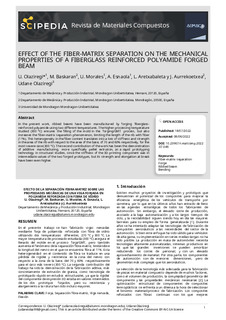Izenburua
Efecto de la separación fibra-matriz sobre las propiedades mecánicas de una viga forjada en poliamida reforzada con fibra de vidrioEffect of the fiber-matrix separation on the mechanical properties of a fiberglass reinforced polyamide forged beam
Egilea
Argitalpen data
2022Bertsioa
Bertsio argitaratuaDokumentu-mota
Kongresu-ekarpenaKongresu-ekarpenaHizkuntza
GaztelaniaEskubideak
© 2022 The AuthorsSarbidea
Sarbide irekiaArgitaratzailearen bertsioa
https://doi.org/10.23967/r.matcomp.2022.07.046Non argitaratua
Revista de Materiales Compuestos Vol. 07. N. 1 - Comunicaciones Matcomp21 (2022) - Sostenibilidad y reciclaje - FabricaciónArgitaratzailea
ScipediaGako-hitzak
Forja
Separación fibra-matriz
Viga nervada
Flexión ... [+]
Separación fibra-matriz
Viga nervada
Flexión ... [+]
Forja
Separación fibra-matriz
Viga nervada
Flexión
Fiber-matrix separation
Forge
Ribbed beam
Bending
ODS 9 Industria, innovación e infraestructura [-]
Separación fibra-matriz
Viga nervada
Flexión
Fiber-matrix separation
Forge
Ribbed beam
Bending
ODS 9 Industria, innovación e infraestructura [-]
Laburpena
In the present work, ribbed beams have been manufactured by forging fiberglassreinforced polyamide using two different temperatures. The higher processing temperature studied (300 ºC) ensures the fill ... [+]
In the present work, ribbed beams have been manufactured by forging fiberglassreinforced polyamide using two different temperatures. The higher processing temperature studied (300 ºC) ensures the filling of the mold in the forging/GMT process, but also increases the fiber-matrix separation phenomenon, limiting the length of the rib with fiber (11%). This heterogeneity in the fiber content translates into a loss of stiffness and strength in the area of the rib with respect to the area of the base, of 70 and 60% respectively, for the most severe case (300 ºC). The second contribution of the work has been the demonstration of additive manufacturing, more specifically pellet extrusion, as a rapid prototyping technology in structural studies, since the stiffness of the 3D printing component was in intermediate values of the two forged prototypes, but its strength and elongation at break have been even higher. [-]
En el presente trabajo se han fabricado vigas nervadas mediante forja de poliamida reforzada con fibra de vidrio utilizando dos temperaturas diferentes, 270 ºC y 300 ºC. La mayor temperatura de proces ... [+]
En el presente trabajo se han fabricado vigas nervadas mediante forja de poliamida reforzada con fibra de vidrio utilizando dos temperaturas diferentes, 270 ºC y 300 ºC. La mayor temperatura de procesado estudiada (300 ºC) asegura el llenado del molde en el proceso forja/GMT, pero también aumenta el fenómeno de la separación fibra-matriz, limitándose la longitud del nervio en el que se encuentra fibra al 11%. Esta heterogeneidad en el contenido de fibra se traduce en una pérdida de rigidez y resistencia en la zona del nervio con respecto a la zona de la base, del 70 y 60% respectivamente para el caso más severo (300 ºC). La segunda contribución del trabajo ha sido la demostración de la fabricación aditiva, más concretamente de extrusión de granza, como tecnología de prototipado rápido en estudios estructurales, ya que la rigidez del componente de impresión 3D estaba en valores intermedios de los dos prototipos forjados, pero su resistencia y alargamiento a la rotura han sido incluso mayores. [-]
Sponsorship
Comisión EuropeaProjectu ID
info:eu-repo/grantAgreement/EC/H2020/768710/EU/Efficient Material Hybridization by Unconventional Layup and Forming of Metals and Composites for Fabrication of Multifunctional Structures/LAY2FORMBildumak
Item honek honako baimen-fitxategi hauek dauzka asoziatuta:






















